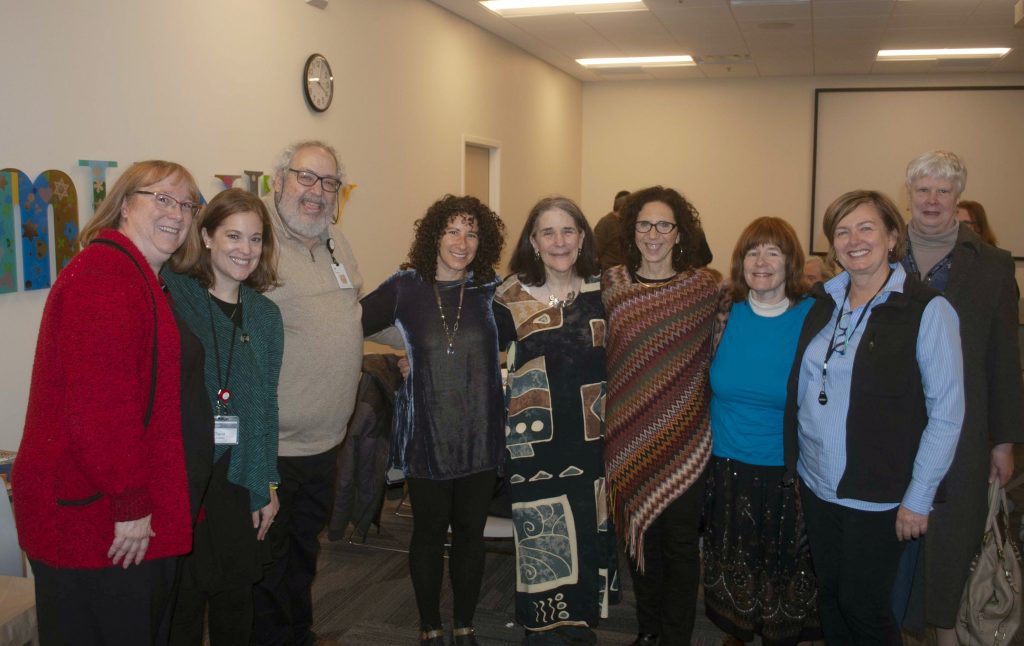Looking back at a career in healing

Judy Marcus retires as JFCS’ Healing Program Coordinator after 22 years
Though Judaism is thousands of years old, the modern-day concept of Jewish Healing Centers doesn’t go back that far. The National Center for Jewish Healing (NCJH) was established in 1994 in response to a national upsurge of interest in reclaiming ancient Jewish spiritual wisdom and resources that could help people deal with the everyday challenges of living with illness, facing end-of-life, or dealing with loss. These Jewish individuals turned to Judaism to find wholeness, hope, comfort and connection in the face of illness and loss.
NCJH planted the first seeds of this movement. JFCS’ Twin Cities Jewish Healing Program (The Healing Program) started as one of NCJH’s first satellite offices and Judy Marcus was hired as its Coordinator just as it began to grow and flourish.
The Healing Program works with individuals and with families going through health journeys, including many who are dealing with end-of-life situations. It is meant to be a resource for everyone in the Jewish community who wants to feel supported and strengthened by Jewish spiritual practices, visits, music, prayers and more.
“The healing concept took the best of our comforting Jewish traditions,” Judy said, “and made them accessible to everyone facing illness. These Jewish spiritual resources could be used as additional strengthening tools alongside modern medicine to help support each person journeying through illness.”
A “perfect fit”
Judy, who retired this month after serving 22 years as The Healing Program Coordinator, described her position as a “perfect fit” for her when she was hired. It allowed her to bring together her background in social work assisting people facing physical issues with her lifelong interest in the practice of Judaism. She had a sense of how much the larger Twin Cities Jewish community relied upon JFCS to help people in times of need. “I wanted to be part of this meaningful enterprise where daily tasks of my job felt like acts of mitzvahs,” she said.

When it was created, The Healing Program’s focus was largely on training bikur cholim volunteers (teaching the traditions of the Jewish mitzvah of visiting the sick). “It was very rewarding to see how eager volunteers were to develop their capacity for compassionate listening and how much they were willing to give of themselves,” Judy said. “It felt like they had a hunger for connecting with others and conveying their care and support .”
Each of the local synagogues were developing their own caring communities and it was a natural fit for The Healing Program to support these communities by providing training for these synagogue volunteers. Judy also helped Sholom Hospice develop a Jewish hospice volunteer training program that incorporated Jewish healing traditions.
Healing Program evolves as community needs change
JFCS’ Healing Program has evolved over the years, and as time spent in hospitals/hospices settings has gotten shorter, Jewish patients increasingly ask for Jewish clergy to make the visits, as opposed to lay volunteers. The Healing Program established a clergy rotation schedule to facilitate timely responses to requests for visits. Rabbis are on call to visit Jewish individuals in healthcare settings who are requesting a visit and are unaffiliated with a local synagogue. The Healing Program helps coordinate these clergy visits, and also does many presentations for hospital chaplains who are not familiar with Jewish traditions and are eager to learn.
“I love this part of the job,” Judy said. “All Twin Cities clergy share generously of their time and of their hearts during each visit they make, and all healthcare chaplains go out of their way to meet the specific needs of their Jewish patients. It’s so touching to see healthcare chaplains desire to learn about traditions and comforting resources of a religion that are not their own.”
Looking back at her time with the program, Judy feels blessed by how much she has learned from its volunteers, as well as the Jewish clergy, and Jewish patients. She also praised the caring communities and congregational nurses from each of the synagogues.
She said that when individuals face a serious illness, they may feel that friends and family do not completely understand all that they are going through, and therefore may feel isolated. Often, friends and family unfamiliar with illness don’t know what to say, or how to comfort their loved ones. When fellow Jews visit and enter this sacred space offering support, patients and families feel comforted knowing that they are accepted and embraced by their Jewish community (regardless of how religious or observant they are).
“Entering an end-of life situation is also entering into a very holy place,” Judy said. “For visitors, it’s about showing up, opening your heart and listening. It’s about respecting and honoring that each person’s journey from illness to healing is uniquely theirs. It has the potential to provide strength and break the isolation that illness may bring. These moments of connection between visitor and visitee provide comfort to both the family and to the individual facing illness, and unite them in a circle of caring and support.”
Ruth Paley, JFCS Clinical Services Director, said Judy has been indispensable to the agency in her time as the Healing Program Coordinator. “As she moves into the next phase of her life, she leaves a legacy here at JFCS of caring, making each person feel that their journey with healing is the most important thing to her,” she said. “We’ll miss Judy, but the Healing Program and all the great work she’s put into it throughout the years will continue and thrive going forward.”
The Twin Cities Jewish Healing Program has created a Jewish Spiritual Companion for Medical Treatment for people facing illnesses, as well as their loved ones. For more information on the program call 952-546-0616.
